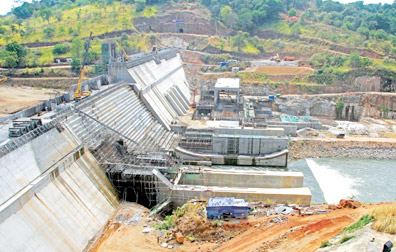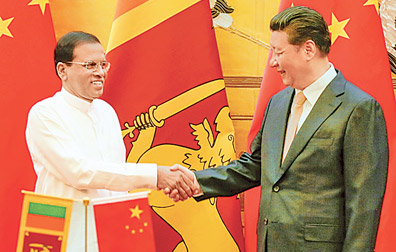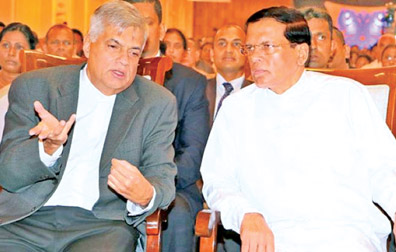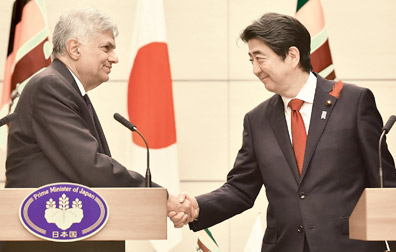'Good Governance': One year on
 |
|
The Moragahakanda project.
Pic: Sudam Gunasinghe |
Exactly one year ago, the people gave a historic mandate to the two
major political forces in the country to work together. Actually, the
process was set in motion eight months earlier, in January 2015 when
Common Presidential Candidate Maithripala Sirisena emerged victorious at
the Presidential Election, beating incumbent President Mahinda Rajapaksa
who was seeking an unprecedented third term in office.
President Sirisena campaigned on the promise - and premise - that
there would be a National Unity Government formed by the UNP and the
SLFP, if he came to power.
The people endorsed this idea and by January 9, 2015, Sri Lanka had a
President from one party and the Prime Minister (Ranil Wickremesinghe)
from another. While this was not the first time it happened in Sri
Lanka, this occasion was significant in that there was a prior
understanding about power sharing in this manner.
This Government did have a 100 -day program which managed to
accomplish quite a lot of promises made during the election period,
though obviously not everything. Hence, the President and the Prime
Minister urged the public to reaffirm their faith in the concept of a
national unity Government to continue on that path.
The public indeed did reaffirm their faith in this Government of
Unity and Consensus, also known as the Yahapalana (good governance)
Government.
 |
|
President Maithripala
Sirisena with Chinese President Zi Jingping. Pic: Courtesy
asiantribune.com |
This name was used because the new Government had pledged to reverse
the dictatorial course of the Rajapaksa Government and free the State
institutions whose freedom had come under attack. The Government had
also inherited one critical challenge - like the proverbial Sword of
Damocles, sanctions and other restrictions were looming on the horizon
through UN Resolutions inimical to Sri Lanka, as a result of the
belligerent attitudes of the previous administration with regard to
Human Rights issues. The Government also had to deal with the debt
burden of the Rajapaksa regime.
More realistic policy
In a sense, the biggest achievement of the Good Governance Government
is extricating Sri Lanka from the abyss of international isolation and
sanctions. Instead of locking horns with the UN and the Western powers,
the Government followed a more realistic policy of open engagement with
the International community, which culminated in its co-sponsorship of
the last UN Resolution. In keeping with the commitments made to the UN
and the International community by the Rajapaksa administration itself,
and also with the recommendations of the Lessons Learnt and
Reconciliation Commission (LLRC) appointed by the former President, the
Government has embarked on a process of accountability, restorative
justice and reconciliation. By next March, when there is likely to be
another resolution on Sri Lanka, an even more comprehensive picture of
this process will emerge.
 |
|
President Maithripala
Sirisena and Prime Minister Ranil Wickremesinghe in animated
conversation |
As a result of these endeavours, Sri Lanka has again become a coveted
member of the International community. Both, the President and the Prime
Minister have been welcomed with open arms in countries that shunned
leaders of the previous regime. More countries have come forward to
grant aid on very favourable terms. Even on a people-to-people level,
several countries have relaxed visa restrictions for Sri Lankans.
The Government has largely succeeded in restoring public confidence
in State institutions, including the judiciary and the police, which
were tampered with, by the previous regime.
The key to this change was the 19th Amendment, which was one of the
key pledges of the new Government. It again set presidential term
limits, pruned certain powers of the executive presidency and restored
the independence of Government institutions. Indeed, the Courts have
since then delivered several verdicts which may be interpreted as being
unfavourable to the Government, but no attempt has been made to
influence the judiciary in any way.
This is in sharp contrast to the previous regime which engineered the
impeachment of the then Chief Justice on flimsy charges.
The Government recently delivered several of its core promises. The
Right to Information Act was finally ratified into law a week ago. This
will enable the public, among other things, to know how the Government
is using their funds. It will take a few more months to become fully
operational due to logistical and manpower challenges, but the concept
itself has now got firmly entrenched in the governance process.
On the reconciliation front, the Government just last week succeeded
in getting the Office of the Missing Persons Bill passed amid Opposition
from the Joint Opposition. The next step is to have a Truth and
Reconciliation Commission which will drive inspiration from the South
African reconciliation process. These are essential steps on the road to
lasting peace and reconciliation.
 |
|
Prime Minister Ranil
Wickremesinghe with his Japanese counterpart Shinzo Abe. AFP
|
The Government is keen to develop infrastructure. The Megapolis
Initiative in the Western Province is a major project that will see an
overall resurgence in the province. After a thorough review, the Port
City project initiated by the former Government with Chinese funding has
been totally transformed as a Financial City to attract more investors.
Financial controversies
Reviews are mixed on the economic front. The controversy surrounding
the appointment of Arjun Mahendran as Central Bank Governor and the
alleged bond transactions overshadowed much of the other good things
that the Government achieved on the economic front. This was finally
resolved only when all concerned parties agreed to the appointment of
respected economist, Indrajit Coomaraswamy to this position.
The Government is also saddled with the US$ 65 billion debt burden
left behind by the previous administration, which engaged in massive
projects that ultimately did not benefit the public at all, including
the Mattala airport. Huge loans were obtained at commercial rates and
once these debts are serviced, there is little money left for
development and welfare. Thus, the Government needs to generate more
funds, which in turn has led to one of the biggest financial
controversies in recent times - the increase of Value Added Tax (VAT) to
15 percent from the earlier band of 11 percent.
A public burdened with an already High Cost of Living did not find
favour with the idea, not to mention traders who feared that higher
prices will deter consumers. However, most have conveniently forgotten
that VAT was once as high as 20 percent. After resolving legal
complications, the Government is set to bring a new VAT Bill in due
course. If the VAT is reduced, finding new sources of revenue will prove
to be a major challenge for the Government in a country where only a
minor percentage of individuals pay income tax.
Most civil society representatives have also been frustrated by the
seemingly slow pace of investigations into cases of corruption alleged
to have been committed by prominent members of the former regime.
However, the Government's stance is that the evidence must be rock
solid. Manpower and logistical problems at Police and A-G's Dept too
have contributed to this delay. Yet, results of the year-long process
seem to be coming in - one example is the confiscation of CSN funds
amounting to Rs.157 million.
Different opinions
Others want faster action on many unsolved attacks, disappearances
and murders that took place during the previous regime. These include
the Lasantha Wickrematunga murder, Wasim Thajudeen murder, attacks on
several journalists, disappearance of Prageeth Ekneligoda, ACF murders,
Trinco 5 case and several other unsolved crimes. Just a few weeks back,
Police arrested one suspect in connection with the Lasantha murder case,
while CCTV footage relating to the Thajudeen case has been sent to
Canada for analysis. Several suspects are in custody in connection with
the Thajudeen and Ekneligoda cases.
The lack of unity in the SLFP has been a thorn on the side of the
Government, with some SLFP members still in the 'Joint Opposition' led
by the former President. There are however, indications that more JO
members would cross over to the Government side.
Moreover, different opinions expressed by SLFP and UNP Ministers in
the Government on the same subject could damage the collective
responsibility of the Cabinet. However, the UNP and the SLFP MOU on the
National Unity Government has now been extended for the full five year
term until 2020, which is a harbinger of good things to come.
Bouquets and brickbats
by Uditha Kumarasinghe
Several Ministers and MPs from both sides shared their views on the
national Unity Government's one year performance with the Sunday
Observer. Excerpts:
SLMC Leader and City Planning and Water Supply Minister Rauff Hakeem:
"Given the difficult financial situation, a legacy of the former
regime, we strove to instil public discipline and good governance
principles, and change the vital sections in the Constitution to enable
independent commissions to function smoothly. When it comes to the
matter of governance, it is solely about implementing development work.
The Government has just completed one year. I should say many of the
projects that were in the pipeline are beginning to get implemented. It
took sometime for us to secure funding and then to roll out those
projects through the transparent procurement process, and it is all in
the interest of the nation. If there was any delay in the implementation
of projects, it was mainly due to ensuring transparency in the interest
of the country. There will be more transparency in our dealings and the
best value for money will be achieved in the implementation of such
projects.
JVP MP Sunil Handunneththi:
"We cannot be satisfied with state enterprises. The same frauds and
other malpractices that occurred during the former regime are still
happening in different forms. The difference now is that there is an
intervention to expose them, unlike during the previous regime. As a
result, there is some sort of control. Methodologies should be
formulated at ministerial level to prevent such frauds. But there is no
such intervention at ministerial level. Some of the recommendations made
by the COPE on certain chairmen of state enterprises have not yet been
implemented.
Then the question arises, Yahapalanaya has not yet been given effect
under the very Yaha Palana Government. However, some of the democratic
changes have been introduced during the past one year tenure of the
Government. Providing opportunity to the people to air their views to
the COPE is one such democratic change. In addition, the very functions
of COPE should be exposed to the people by the media. Only crooks are
scared to appear before the law.
Disaster Management Minister Anura Priyadharshana Yapa:
Strictly speaking, this Government is facing lots of problems
inherited from successive Governments, internally as well as externally.
The Government is burdened with the recovery of repayments, which is
painful, in consequence of which government revenue has declined
severely.
The Government's one year performance is good. Although there was a
downturn of the world economic situation last year, I think we have
faced it well. With regard to certain investments, such as, the Port
City, the Government has been able to change most of the conditions laid
down earlier and made them favourable to us. The bilateral ties with
USA, UK, European countries , China and India have since been improved.
Joint Opposition Leader and UPFA Colombo District MP Dinesh
Gunawardena:
The Government is failing in all fronts. It is very clear, there is a
big disparity in what they had pledged and what has been achieved. What
is happening today is that those who supported them beyond party
loyalties are totally discontented. The Government could not in fact
present the VAT Bill in Parliament on Tuesday. When the Government
assumed office, they pledged so many things to the people, but they
cannot deliver the goods. Perhaps they have overestimated themselves.
The Government does not have a clear program. They have merely become
emotional on their being voted to power. The reality is, they could not
properly tackle the budget crisis which is very serious.
The Government has not started anything new during the past one year.
In the future too, they have nothing new to offer to the people other
than burdening them with hardships. How could one say the Government has
performed well? They have not even fixed the dates for Local Government
Elections
Finance Minister Ravi Karunanayake:
The full benefits of our programs have been passed down to the
people, while more should be given. We are making every effort to
accomplish this task. In one year, we have accomplished many notable
tasks that the previous Governments could not do. |

